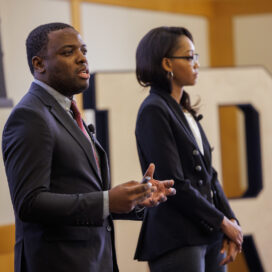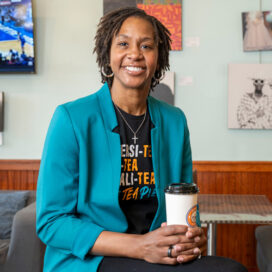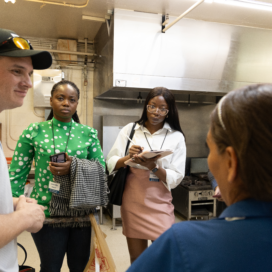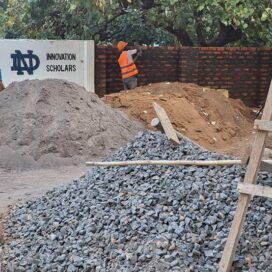‘I will never forget the cries of those people’
Published: October 27, 2020 / Author: Carol Elliott
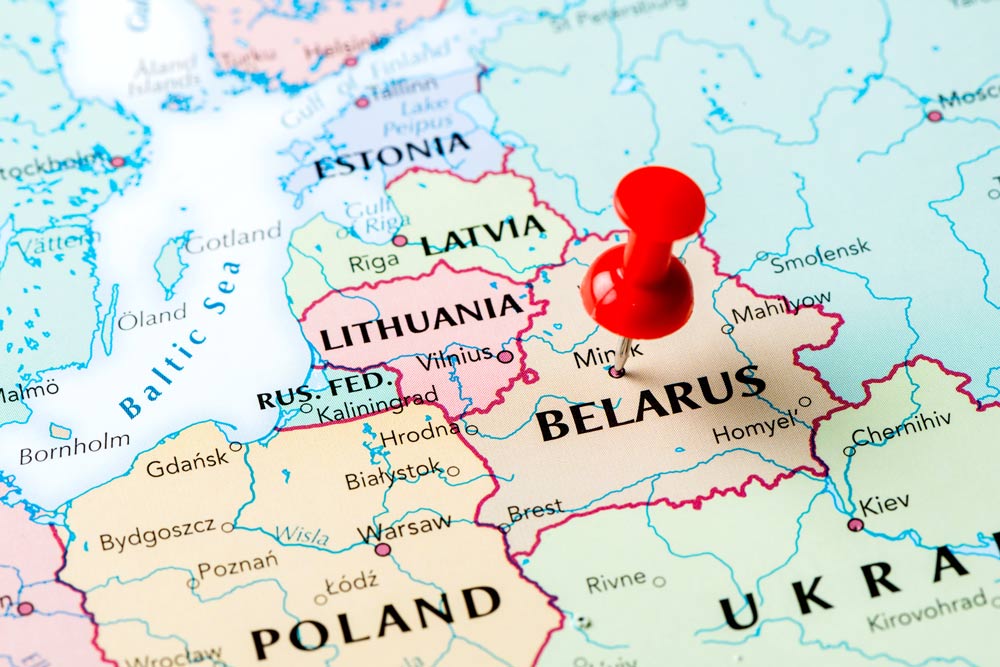
On August 9, 2020, Rodion Begliak (MBA ’19) stepped into the street in his hometown of Homyel, Belarus, and clapped.
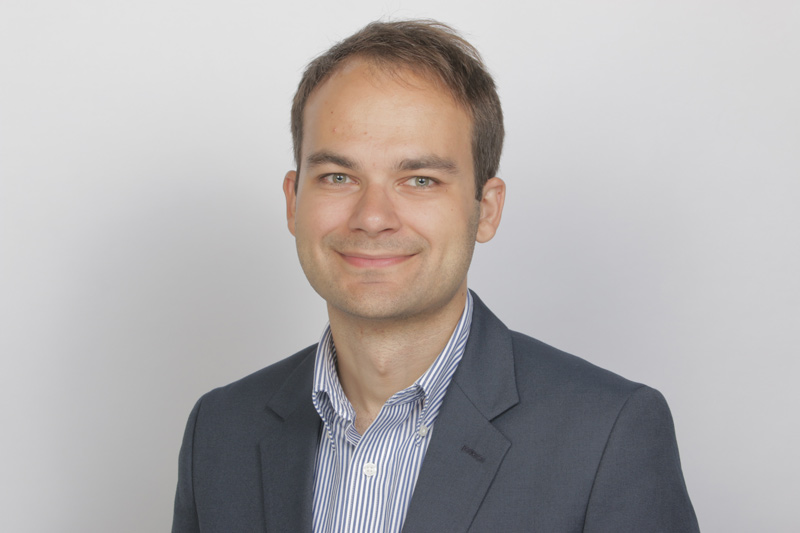
Rodion Begliak (MBA ’19)
Earlier that day, the official results of the presidential election in Belarus showed incumbent president Aliaksandr Lukashenko winning 80% of the vote – a clearly falsified result. Hundreds of thousands of Belarusians took to the streets, clapping like Begliak to protest.
What followed for Begliak and hundreds of thousands like him was a struggle for their very lives as government forces moved in to suppress the protestors. In fact, according to news reports, mass protests have rocked Belarus for almost two months, with authorities detaining thousands and injuring many more peaceful protesters with truncheons, rubber bullets and stun grenades.
Begliak himself was arrested, horrifically beaten and imprisoned before eventually fleeing to Russia. Now living in Latvia, he first gave his account as part of a Nanovic Institute for European Studies virtual panel discussion “Belarus: Last Day of the Last European Dictatorship?” held Sept. 3. Here, he recounts his story.
Tell us about growing up in Belarus.
I was born and grew up in Belarus, and all of my family still lives there. As many members of my generation, I was fortunate to partly grow up in a free country. For three years after the Soviet Union collapsed in 1991 and until Lukashenko’s election in 1994, Belarus was a democracy.
For me, freedom means a lot. It is like a drug – if you have ever tasted it, you will never forget what it is like. You will not want to return to prison. Unfortunately, in my country, there are lots of people whose entire formation happened under the Soviet Union and who became afraid of freedom and responsibility in 1994. That is why for 26 years we returned to authoritarianism.
But now the situation is changing. The new generation of Belarusians are no longer afraid of the necessity to make our own choices like our parents – we strive for it. And the current political crisis in Belarus is the result of this desperate struggle.
How did you come to Notre Dame?
The life of a person who desires freedom but who lives in an unfree country is never easy. Time after time, you have to prove that you are good enough to be tolerated for your talent despite your political position. And I am not a superhero. I often failed. This happens not only in countries but in organizations, too. Good bosses foster the diversity of opinions – while bad ones demand blind obedience and following the herd. After one such failure, I decided to try something new and go abroad. I thought that the world is big and there will be a place for every human. I just needed to find the one that will accept me.
I had never been to the United States before, and I decided to try. As I was out of job, I could study all day. And I studied hard! As a result, in four months I was able to pass international exams better than 99% of other candidates in the world. That is how I got accepted to Notre Dame.
I chose Notre Dame because I liked the position of the University that honesty and ethics should be first, money second. That deeply corresponded to my internal feeling about what the world should be like. Unfortunately, after the graduation in 2019, I failed to find a job offer in the U.S., and I had to go back to Russia to work for an international consulting company.
Describe briefly the current political situation in Belarus.
As I said, Belarus has changed a lot in recent years. The changes were slow and inside the minds of the people, which is why they were so hard for political authorities and external observers to notice. But they became evident during the current election campaign.
That was when something extraordinary happened in Belarus. Three very brave men decided to run for the presidency – Sergei Tikhanovsky, Valery Tsepkalo and Viktor Babariko. Many people had tried to beat Lukashenko in the past; all of them got killed or thrown in prison and then forced to emigrate. These three men believed in a peaceful change in Belarus and decided to try to bring it about. Lukashenko used his usual tactics. Tikhanovsky and Babaryka were arrested even before the official nomination. Tsepkalo was denied the nomination with falsification of the election documents from the side of authorities and was forced into exile.
Their offices became leaderless. But their place was taken by three brave women, only one of whom, Svetlana Tikhanovskaya, the wife of Sergei Tikhanovsky, was able to obtain the official status of the presidential candidate. The other two campaign offices united around her and provided all possible help. Seeing this example of unity, all Belarusians united around Svetlana. No wonder that during the election, Svetlana received from 60% to 80% of votes in the electoral districts where election commissions were honest enough to count the votes fairly.
But Lukashenko once again refused to play fairly. He and the central election commission (which he controlled) ridiculously announced that 80% of voters voted for him (there were no independent observers to the elections and all ballots were immediately destroyed), essentially stealing the elections from Svetlana and the Belarusian people. These results were so unrealistic that almost all Belarusians came out on the streets on Aug. 9 and 10 to protest.
And then the terror began. Lukashenko used corrupt special police forces, and allegedly Russian mercenaries, to kill and beat unarmed protesters. And now for more than 70 days, people in black masks brutally attack and kill innocent protesters and even regular people on the streets of our cities.
You described going out into the street because you had to. What motivated you to act?
Initially, I didn’t want to return to Belarus for the elections. I knew the nature of Lukashenko and was afraid of going there. But my newborn child needed certain documents and there was no way to obtain them from abroad.
I arrived in my hometown on Aug. 8, 2020.
I am a pretty average person. I am far from being the definition of a political activist, but we all had to become activists this summer in Belarus.
I voted in the morning of Aug. 9. Initially, everything was going well. We saw reports of huge numbers of Belarusians standing at the election booths to vote for change. It was very inspiring. But in the middle of the day, the internet in the country suddenly disappeared.
People kind of expected this, and almost everybody had a VPN software installed on his or her phone. In the evening, I turned on the internet and saw how police special forces were killing protesters on the streets of Minsk (the capital of Belarus). At the moment, I realized that I cannot stay at home that night too. I went to the central street of my city to clap my hands and protest against the incredible violence happening in our capital.
Clapping is a special sign in Belarus. About seven years ago, people in Minsk started to clap hands on the streets as a sign of protest. At that time, the protests were suppressed because they were far less massive, but the gesture remained.
Everyone knew what it meant.
What happened next?
I was arrested almost immediately. I was not able to even realize what was happening. Special police units came up from behind me and a split second later, I was lying on the streets with my hands behind my back and the officer’s arm around my throat. I couldn’t do anything.
They took me and several others to the nearby police station and made us sit near the walls. At that moment, I was relatively calm. I thought that just being arrested was pretty bad and that my parents would be worried.
But then I started to understand that not everything was so simple. I started to see the incredible, almost unbelievable degree of hatred that the senior police officers had against us. They were shouting to put us against the walls and to teach us a lesson on how to behave in “their country.”
Then they started to beat us. I was beaten with my arms behind my back by four special forces officers. Luckily for me, there was an officer around who stepped in and stopped the beating, so I got off relatively easy. Still, I couldn’t sleep for 10 days after that because the hematomas on my legs were hurting too much. The other guys around me — and even more horribly, the teenagers — were beaten much more severely.
I think the amount of cruelty that I saw during those two hours was equal to the amount of cruelty I saw during all of my previous life.
The next day, we were put on trial where I was sentenced to 10 days of detainment. The judge said that he gave me a mild sentence taking into account that I had never been arrested by the police before. After the trial, on our way to prison, we were taken to another police station to wait for transportation. We started to feel better. Nobody was beating us anymore and we were even able to make some friends among the police officers.
But we were wrong. In the evening, they started to bring a new shipment of freshly detained people and everything started all over again. We were put down with our face in the ground while they were beating the newcomers.
I will never forget the cries of those people. They were just beating people to death. And we had to lay down and listen. And if one of us dared to even move to see anything, he got beaten too. This was the most horrible night in my life.
A young guy sitting near me went crazy right then and there from what he heard. He was separated from us. We later learned that he was found dead in a hospital three hours later with all his fingers and his skull broken.
The rest of us were taken to prison that night where we spent the next two days, with very little food, no soap or toilet paper or even a bed. All this time, we felt that the police officers around us could easily beat to death anyone of us at any moment and no one will ever find our bodies after that. This seemed like the same terrible feeling experienced by those who were captured by the Gestapo and taken to an extermination camp.
We were unexpectedly released on the third day. We learned afterward that it happened because Belarusian women all around the country went out into the streets with flowers, demanding that the government stop the violence immediately. They were terrified and ready to die. But they saved our lives.
Several days after that, I fled to Russia and then crossed the border to Latvia, where I applied for political asylum. I will never be able to return to Belarus again.
I feel bad. I don’t know how I can help Belarusian people who still fight against the regime, including the same Belarusian women who saved me and who are being arrested at this very moment.
I do everything that I can to talk about the situation in Belarus with all possible people. I share the information about political asylum with other protesters who are still in Belarus. I donated some of my scarce money for help to other victims of the Lukashenko regime.
I hope that with my words I will be able to initiate a strong international reaction to the events in my country, criminal prosecution and sanctions against Lukashenko that are so necessary at the moment. My dream is to initiate international criminal proceedings for the crimes committed by Lukashenko and the special police forces.
What are your plans for the future?
I will start to build my new home in Latvia from scratch. Or maybe in some other Eastern European country. Living in safe circumstances gives me more power to help my fellow citizens as well as my new home country. And I will continue to fight by all possible means to stop the regimes of Lukashenko and Putin. (Recently, Putin promised military help to Belarusian police to calm down the protests and gave Lukashenko $1.5 billion to finance his repressions).
What do you wish your fellow MBA alums, professors and others understood about the situation in Belarus?
I want my Notre Dame family to understand that there are evil people in the world. These people will lie and do whatever to remain in power. They work hard to undermine democracies everywhere they can reach. We need to be strong if we want our way of life and our values to win.
These evil forces exploit the weaknesses in our societies to fight us. They slice and dice us, trying to push men against women, blacks against whites, right against left and so on. They exploit inequalities, social conflicts, greed and corruption in our countries.
If we want to continue to live in free societies, if we want this for our children, we should put our common future before our personal economic interests. The changes happen fast and the threat is much more imminent than many Americans and Europeans think. We should remind ourselves about the principles our grandfathers used to fight such evil 70 years ago: science, honesty, bravery, respect for human rights.
With this, we will win.

